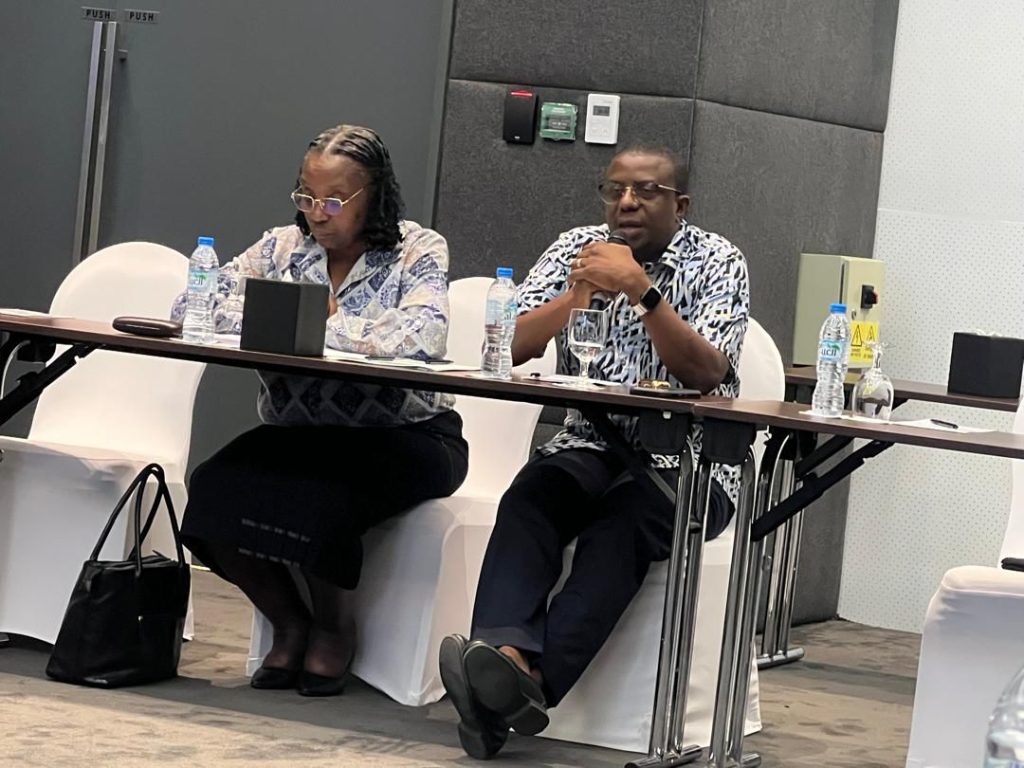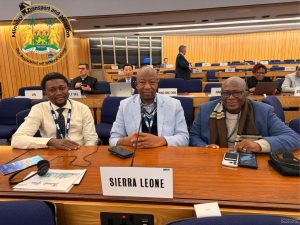Umaru N. Koroma Chairs African Meeting on Diamond Transparency at Kimberley Process

Deputy Minister of Mines and Mineral Resources, Umaru Napoleon Koroma, is in Dubai, UAE, for the Kimberley Process Plenary Meeting, which will run from November 12th to 15th, 2024, at the JAFZA Conference Center. This year’s plenary gathers key stakeholders from across the global diamond industry, including government representatives, diamond producers, and civil society groups, to discuss important issues regarding the international diamond trade and its impact on global peace and security.
As a critical member of the African Diamond Producing Countries, Deputy Minister Koroma played a significant role in preparing for the plenary by chairing a key meeting with African representatives. The goal of the meeting was to articulate and unify Africa’s position on several key issues, with particular attention given to the ongoing conflict in the Central African Republic (CAR), which has become a focal point for the Kimberley Process.
The Kimberley Process Certification Scheme (KPCS), established in 2003, is a global initiative aimed at ensuring that conflict diamonds, or blood diamonds, do not enter the international market. These diamonds are mined in war zones and sold to fund armed conflict against legitimate governments. The Kimberley Process was created to curb the trade in these illicit diamonds, which have historically fueled violence and instability in diamond-rich regions of Africa.
The scheme works by requiring that diamonds traded internationally be certified as conflict-free. Countries participating in the Kimberley Process must establish national systems to control the import and export of rough diamonds, ensuring that they are not used to finance rebellion or violence. Since its creation, the Kimberley Process has been instrumental in reducing the trade in conflict diamonds, but challenges remain in fully implementing the scheme and addressing emerging issues such as diamond smuggling and non-compliance by certain countries.
One of the most pressing issues on the agenda for this year’s plenary is the ongoing conflict in the Central African Republic (CAR). Rebel groups in the CAR have continued to exploit the country’s diamond resources, using them to finance armed insurgencies and perpetuate violence. This situation has been a point of contention within the Kimberley Process, with calls for stronger action to prevent CAR’s diamonds from entering the international market.
At the plenary, Deputy Minister Koroma and other African leaders are expected to push for a collective stance on how the Kimberley Process can more effectively address the CAR conflict and prevent diamonds sourced from rebel-controlled areas from reaching global markets. Africa’s position is likely to focus on increased monitoring of diamond exports from conflict zones, enhanced transparency in diamond supply chains, and accountability for governments and companies that fail to adhere to Kimberley’s standards.
The Deputy Minister emphasized that African diamond-producing countries must remain at the forefront of this effort, ensuring that their diamonds are mined ethically and sold through legal, transparent channels. This is crucial not only for the credibility of the Kimberley Process but also for ensuring that Africa’s vast diamond resources do not contribute to violence and instability.
During the Kimberley Process Plenary Meeting, several important topics are expected to dominate the discussions:
- Strengthening the Kimberley Process: A significant focus will be on ensuring that the Kimberley Process remains effective in its mission to stop the trade in conflict diamonds. This includes reinforcing compliance mechanisms and addressing loopholes that allow diamonds from conflict zones to enter global supply chains.
- The Central African Republic (CAR): The conflict in CAR remains a central issue for African countries at the plenary. African nations, led by Deputy Minister Koroma, will advocate for more stringent measures to curb the flow of diamonds from rebel-controlled territories, pushing for greater oversight and sanctions for non-compliant states.
- Transparency and Accountability: There will be calls for more robust monitoring systems to track diamonds from their point of origin to their final destination. Ensuring that diamonds are sourced ethically and sold legally is paramount to the success of the Kimberley Process.
- Cooperation and Engagement: African diamond producers are seeking to deepen their cooperation with the Kimberley Process Monitoring Team, diamond industry stakeholders, and global civil society groups to promote responsible mining practices and sustainable development within the diamond sector.
- Diamonds and Development: Another key area of focus will be ensuring that diamond resources are used to benefit the people of diamond-producing countries, particularly in Africa. Deputy Minister Koroma is expected to advocate for initiatives that promote economic development, job creation, and community welfare in mining regions.
Sierra Leone, with its rich diamond history, has been a significant advocate of the Kimberley Process since its inception. The country’s commitment to ethical diamond mining has been a cornerstone of its strategy to ensure that diamonds contribute positively to the nation’s development, rather than fueling conflict or exploitation.
Deputy Minister Koroma has consistently emphasized the importance of upholding the principles of the Kimberley Process, not only for the benefit of Sierra Leone’s diamond industry but also for the broader global diamond market. By attending the plenary and participating in key discussions, he underscores Sierra Leone’s commitment to combating the trade in conflict diamonds and ensuring that the country remains a responsible player in the international diamond industry.
Looking Ahead: The Path Forward for the Kimberley Process
As the Kimberley Process Plenary Meeting unfolds, all eyes will be on how African nations, led by Deputy Minister Koroma, navigate the complex issues surrounding conflict diamonds and transparency. The meeting provides a critical opportunity for African countries to push for stronger enforcement measures and a more unified approach to ensuring that diamonds are not used as a tool for violence and instability.
The Kimberley Process Plenary Meeting in Dubai represents a significant opportunity for global stakeholders to come together and address the ongoing challenges of conflict diamonds and unethical trade practices in the diamond industry. Through their participation, Deputy Minister Umaru Napoleon Koroma and the African Diamond Producing Countries aim to strengthen the Kimberley Process and ensure that diamonds continue to be a source of development and peace for Africa, rather than contributing to conflict and human suffering.





